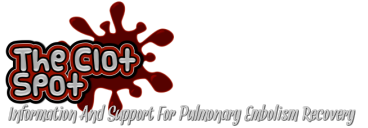"We know what is wrong. You have blood clots in your lungs." These are words that survivors come to be grateful for and to hate. As a survivor we are often thankful that we finally have a diagnosis and a treatment for symptoms that for many of us have been happening for an extended period of time. Others are thankful to simply be alive. They were the ones that collapsed and were returned to life by acts of God, fate, and medical miracles. The doctors patch us up, test us, clear us, and send us home on anticoagulation and filled with questions.
As patients we start off with many unanswered questions. Why did this happen? How long is recovery? What are these nagging symptoms? We are frustrated when we don't have answers to these questions but these questions aren't the real challenge. These questions will be slowly answered by hiring new doctors, asking questions over and over again, and reading materials from patient support and advocacy groups. The real questions, the ones that are truly a challenge are the ones that nobody can answer. "What do I do now that I survived?" "Why did I survive?" "How do I find faith in my ability to survive?"
If these ruminations sound familiar you are a survivor. Know that your brain is an organ. If your brain survived your PE without any symptoms I would be in shock. Your lungs, heart, body, and brain are all affected when you have clots in your lungs. Common complications include panic disorders, depression, and anxiety. Feeling lost and/or afraid is normal and in many ways these feelings are a healthy part of your recovery.
So, what to do about them? First, let your doctors know that your brain is in need of healing. You may benefit from starting some medication to ease your symptoms. Councilling may also help you to deal with surviving. I used both of these techniques to help myself heal.
Here are some additional methods to assist your mind, body, and soul adapt to being a survivor:
- Track your growth so you can see progress. A fitbit can do the work for you these days.
- Ask your doctors if massage or Yoga would be safe and then try them out if your medical team okays these activities.
- Try meditation. Search for "The Mediation Podcast" or "The Meditation Oasis" as both have free recorded meditations.
- Try an app called "Breathing" to practice deept breathing that will be calming.
- Realize your strength. You survived! You are not weak. Your body wend through the ringer and was OK. You can and will get through recovery.
- Try a support group. Www.dailystrength.org has a great one.


 RSS Feed
RSS Feed

